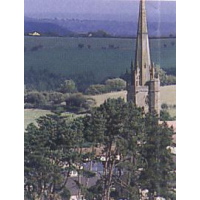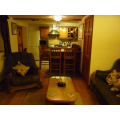
|
|||||

Life Changing Activi..
 Fun, adventure, and personal growth in the Great Outdoors Fun, adventure, and personal growth in the Great Outdoors
Hippo The Watersaver
 is the simple, proven and low cost water saving device to help conserve water i.. is the simple, proven and low cost water saving device to help conserve water i..
Gallery 54 - Ross on..
 Contemporary abstract art, ceramics and glassware Contemporary abstract art, ceramics and glassware
|
Ruardean
 Ruardean is a small village to the west of Cinderford. Situated on a hillside with commanding views west towards the mountains of South Wales. Little now remains of the village's industrial history, but once it was a centre for iron ore smelting furnaces, forges and coal mines. There is the remains of a Norman castle, now little more than a mound , which commanded the shortest route from Gloucester to the Welsh Marches and the Wye valley. The 1831 census for Ruardean shows just 127 families, half employed in agriculture and half in other trades, with 160 people on poor relief, showing the obvious poverty in the area at the time. Ruardean is a small village to the west of Cinderford. Situated on a hillside with commanding views west towards the mountains of South Wales. Little now remains of the village's industrial history, but once it was a centre for iron ore smelting furnaces, forges and coal mines. There is the remains of a Norman castle, now little more than a mound , which commanded the shortest route from Gloucester to the Welsh Marches and the Wye valley. The 1831 census for Ruardean shows just 127 families, half employed in agriculture and half in other trades, with 160 people on poor relief, showing the obvious poverty in the area at the time.The first school was established in 1774, and by 1833 it provided 43 places. In addition to the impressive church, a chapel was built in 1798, and from 1801 to 1861 it was under the charge of rev. John Horlick. The Horlick family, notably James and William became famous for the method of producing dried milk with added malt - later to become world famous. The original malting shed still stands in Ruardean, a small stone building behind the Malt Shovel public house, although it may shortly be removed and rebuilt on a different site in the village. When you visit the Malt Shovel in Ruardean, be a little wary about asking "who killed the bears". It will revive a hundred year old animosity between the villagers of Ruardean and Cinderford..... but we will leave you to find out the whole gory story for yourself.
Churches
The church of St John the Baptist is to be found at one of the highest parts of the Forest of Dean. Spectacular views are afforded from the church, which dates from 1111AD. The Lady Chapel consists of the original building with the larger nave, chancel, tower and spire being 14th century additions. The twoer commands sweeping views of the Wye Valley and Welsh Mountains, and trips up to the battlements can be arranged for visitors.
In a field nearby are the remains of an old manor house, known locally as The Castle, which was reputedly destroyed during the Civil War by Cromwellian troops. Outstanding features of the church consist of a carving of the Virgin Mary over the south porch and a tympanum representing St. George and the Dragon above the south door. This is dated to the 12th century and was carved by the Hereford School of Sculpture. In the bell tower there is a painting of the tympanum and inserted in the wall to the left of the front door, is a small carving of fish also dating from the 12th century. This carving was lost to the church for 800 years, rediscovered in a local cottage in 1985 and returned to its original home.
Schools
Ruardean C.of E Primary School
Nearby Accommodation
|
||||
|
|
|||||
